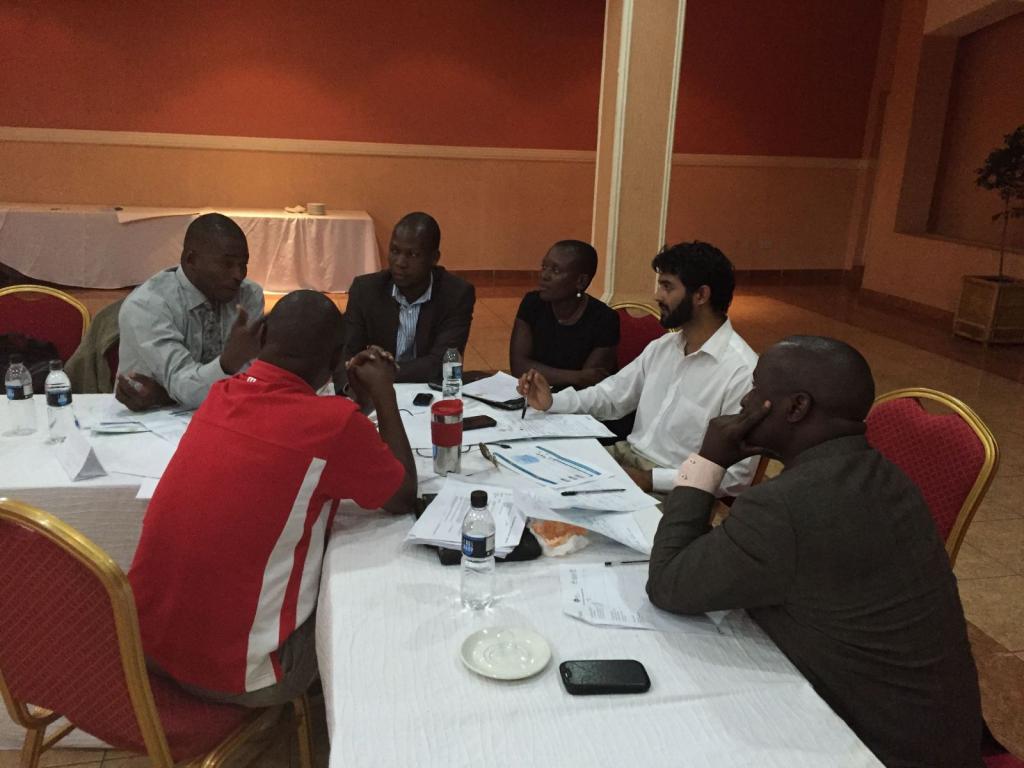Reaching farmers with climate services in Malawi and Tanzania

National stakeholders met to discuss how to enhance the flow of climate information and weather-based agro-advisories in Malawi and Tanzania.
What happens if the climate forecast and agro-advisory information produced at the beginning of the season do not reach farmers and pastoralists? Or what if they do but farmers and pastoralists fail to understand the forecast or what decisions they need to make?
Over 53 public and private sector stakeholders met in Malawi and Tanzania in April 2015 to ponder over these questions and many others. These meetings were held as part of the Global Framework for Climate Services (GFCS) Adaptation Programme for Africa; a multi-agency programme funded by the government of Norway. The meetings aimed to brainstorm on best possible ICT and radio interventions required to address gaps identified in existing climate and agriculture advisory information delivery systems. The workshops were jointly organized and undertaken by the CGIAR Research Program on Climate Change, Agriculture and Food Security (CCAFS) and the World Food Programme (WFP).
Representatives of different sectors including climate, agricultural research and extension, farmer organizations, private sector cell phone providers such as Airtel and rural radio leaders discussed an ideal model for climate and agriculture advisory information flow in their countries. They then jointly identified and validated three components (content production, message delivery and end-users feedback) of a successful national model for climate services communication to reach the end-users.
Key components: National model for climate services
View the Tanzania model below
Under content development, participants discussed the co-production of tailored climate information services by climate, agricultural research and extension agencies. The content should respond to the identified needs of farmers and pastoralists, and must integrate their pre-existing local knowledge. The second component entailed message delivery. The co-produced climate information messages for farmers and pastoralists should be delivered through the most effective channels availed by new ICTs and rural radio. While radio is still the most important source of information for rural farmers, there is need to take into account their preferences in terms of information access. Finally, under farmer feedback, it was agreed that evaluation of the effectiveness of the communication process is needed. This is possible by seeking feedback from farmers and pastoralists. Furthermore, farmers' input must be sought when designing climate services that target them.
View Malawi model below
Main outcomes of the workshops
Coordination among stakeholders was identified as a key factor in producing content to be used by farmers and pastoralists in support of farm decisions. Partnerships among climate, national meteorological agencies, agricultural research and extension, NGOs and UN support organizations was recommended as particularly important for the development of appropriate climate services, and the content of agro-meteorological advisories. Under message delivery, both push (for example providing seasonal outlook to farmers directly) and pull factors (creating demand for products, for instance, through radio messages) were identified as critical in providing feedback to content developers and users. Additionally, they ensure successful message delivery. Mobile and radio platforms, such as farmer hotlines and interactive voice response among others, were singled out as key elements needed to ensure proper user feedback and incorporation of farmers’ input to the design and delivery of climate services.
The workshop process
These two national workshops built on a number of consultation processes that aimed to identify an effective process to deliver climate and agro-advisories to farmers and pastoralists in both countries. These processes also built on previous scoping studies which identified gaps, opportunities and challenges for rural farmers and pastoralists, within target project districts in Tanzania and Malawi with regard to access and use of relevant climate information.

National stakeholders discuss options to enhance the flow of climate information and weather-based agro-advisories in Lilongwe, Malawi. Photo: H. Kaur (CCAFS)
Along with agricultural extension advice, and existing potential for ICTs and interactive rural radio programs, scoping studies identified challenges and opportunities to scale up the delivery of climate information services for millions of farmers within target project districts in Tanzania and Malawi.
At the end of the workshop, participants adopted models for upscaling climate services for farmers, with clear identification of stakeholders and the roles they needed to play under each component of the model in Tanzania and Malawi (content development, message delivery and user feedback).
Additional reading
Coulibaly Y. J., G. Kundhlande, N. Amosi, Tall A., Kaur H., Hansen J., 2015. What climate services do farmers and pastoralists need in Tanzania? Baseline study for the GFCS Adaptation Program in Africa. CCAFS Working Paper no. 110. CGIAR Research Program on Climate Change, Agriculture and Food Security (CCAFS). Copenhagen, Denmark.
Hampson KJ, Chapota R, Emmanuel J, Tall A, Huggins-Rao S, Leclair M, Perkins K, Kaur H, Hansen J. 2014. Delivering climate services for farmers and pastoralists through interactive radio: scoping report for the GFCS Adaptation Programme in Africa. Copenhagen, Denmark: CCAFS Working Paper no. 111. CGIAR Research Program on Climate Change, Agriculture and Food Security (CCAFS).
Coulibaly YJ, Kundhlande G, Tall A, Kaur H, Hansen J. 2015. Which climate services do farmers and pastoralists need in Malawi? Baseline Study for the GFCS Adaptation Program in Africa. CCAFS Working Paper no. 112. Copenhagen, Denmark: CGIAR Research Program on Climate Change, Agriculture and Food Security (CCAFS).
Arame Tall is the Global Coordinator, Champion, at CCAFS Climate Services. Katiuscia Fara is a Climate Services Advisor with the World Food Program (WFP). Harneet Kaur was coordinating the GFCS project in Malawi and Tanzania in 2014 and early 2015. Contributions were received from Daniel Longhurst, Alic Kafasalire (Malawi) and Sixbert Mwanga (Tanzania) who work under the GFCS project.



